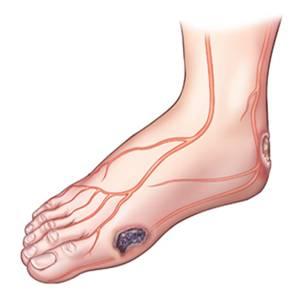What is Diabetes Foot?
 The foot is especially affected by diabetes because:
The foot is especially affected by diabetes because:
- diabetes damages the nerves (damage can occur to the foot and not be detected) – this is called peripheral neuropathy.
- diabetes also affect the circulation. Poor circulation can affect the ability of the body to heal when damage occurs.
- those with diabetes are more prone to infection – the body’s processes that normally fight infection respond slower and often have trouble getting to infections due to the poor circulation.
- diabetes can also affect the joints, making them stiffer
- other diabetes complications that can also affect the foot, for example, kidney disease (affects proteins that are involved in wound healing) and eye disease (can’t see the foot to check for damage).
Complications of Diabetes Foot
- the foot may get damaged and you do not know about (for example, your shoe rubs a sore onto a toe that gets infected – you can not feel it because of the peripheral neuropathy – you can not heal very well due to the infection and poor circulation ).
- foot ulcer are common (see below)
- infections can spread
- the ultimate of this process is an amputation. Diabetes is the main cause of amputations.
- Charcot’s joints is another complication of diabetes in the foot, especially if peripheral neuropathy is present – the neuropathy cause a numbness (imagine spraining your ankle and not knowing you have done this. You will continue to walk on it – imagine the damage that this would do. This is what happens in a Charcot foot )
Diabetec Foot Care
Moisturize your feet—but not between your toes. Use a moisturizer daily to keep dry skin from itching or cracking. But DON’T moisturize between the toes—this could encourage a fungal infection.
Cut nails carefully—and straight across. Also, file the edges. Don’t cut them too short, since this could lead to ingrown toenails.
Never trim corns or calluses. No “bathroom surgery”—let your doctor do the job.
Wear clean, dry socks. Change them daily.
Avoid the wrong type of socks. Avoid tight elastic bands (they reduce circulation). Don’t wear thick or bulky socks (they can fit poorly and irritate the skin).
Wear socks to bed. If your feet get cold at night, wear socks. NEVER use a heating pad or hot water bottle.
Shake out your shoes and inspect the inside before wearing. Remember, you may not feel a pebble—so always shake out your shoes before putting them on.
Keep your feet warm and dry. Don’t get your feet wet in snow or rain. Wear warm socks and shoes in winter.
Never walk barefoot. Not even at home! You could step on something and get a scratch or cut.
Take care of your diabetes. Keep your blood sugar levels under control.
Don’t smoke. Smoking restricts blood flow in your feet.
Get periodic foot exams. See your foot and ankle surgeon on a regular basis for an examination to help prevent the foot complications of diabetes. Contact us for an appointment today!
